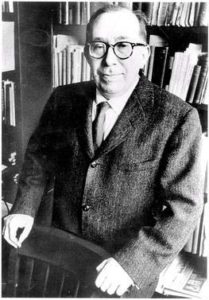FYP Letters is a series of non-curricular notes to keep us in touch over the next days and weeks. They are a combination of original writings and archival ones, including some re-printed FYP News items. — Dr. Susan Dodd, Interim FYP Director.
My Leave
I first wrote this more than a month into my leave of absence, but before the University declared the end of in-person classes. At that time, I said, “I still feel a kind of distant communion with the unfolding of the Foundation Year Program”; of course, the change to on-line teaching makes this feeling of connection even stronger.
The focus of my leave is for me to write a book on Leo Strauss (1899-1973), the twentieth century thinker who is credited with reviving what he calls classical rationalism and a classical understanding of natural right. I was asked some time ago by a now long-suffering publishing house in England to contribute a volume about Leo Strauss to their “Key Contemporary Thinkers” series. Strauss is a deeply divisive and highly controversial figure whose work and the work of his many students has been tied to the rise of “neo-conservatism” and from there to a whole series of public and foreign policy initiatives of the United States.

Leo Strauss (1899-1973).
But it is not just that Strauss’s thought arouses strong opposition, there is an equally fierce debate simply about what he is actually saying. There is a wide array of readings of Strauss that have him say not just different, but even completely opposed things. For some his thought is a fairly benign form of conservatism that stands against modern skepticism and relativism in the name of a sense of natural or abiding principles of morality and justice, seeking to recall human nobility and above all the nobility of philosophy. This benign Strauss can be seen to be a “friend of democracy” seeking to curb just those excesses of moral relativism that lead to the rise of Hitler in the midst of Germany’s first liberal democracy in the 1930s. Strauss lived to experience this terrible outcome and sought to limit the same forces that might be at work in the America he found refuge in. That is the “good” Strauss.
The “bad” Strauss, who was vilified in a series of newspaper articles and magazine articles, especially during the Second Gulf War in the early 2000s, is far from benign. One of Strauss’s most notable scholarly accomplishments was to “discover” the art of what he calls “esoteric writing”. The idea here is that the greatest philosophers had a public, exoteric, teaching that would be acceptable to the society in which they lived and a hidden bolder, more radical esoteric teaching that the careful, philosophical reader could discern. Well, of course, commentators argued that the same was true of Strauss himself: he said he was a friend to liberal democracy, but he was no such thing. He said he was most deeply opposed to the thought of Nietzsche, but he was in fact a secret Nietzschean, an opponent of liberal democracy and its egalitarian practices, and principles of open and responsible government. This Strauss argued for a secret ruling of the “wise” over the many (hoi polloi in Greek). Such rule could engage in lying, dissimulation and use of extra-constitutional power by a band of “enlightened” students of philosophy, by a kind of cadre of Nietzschean ubermenschen.
My own connection to and interest in Leo Strauss did not arise from such partisan contestations, but really came to me as a student in the Foundation Year Program. While I was moved and excited by many things in my year in FYP, I was completely bowled over by my first encounter there with the thought of Nietzsche – who was being read again this year during my leave. Not only was reading Nietzsche life-altering for me, but so was encountering the professor who taught him to us. This was George Grant: perhaps the most important political philosopher Canada produced in the twentieth-century; certainly our best writer of political thought. While there is much that I, both then and still, find to disagree with in Grant’s thinking, it nonetheless had huge impact in making me reconsider my middle class liberal Canadian views.
Grant had many influences on his thought, but especially significant for his critique of modern political thought was the work of Leo Strauss. This Strauss tended to be closer to the benign version I sketched out above. I became intrigued with Strauss’s thought which I found to have a certain kind of compelling quality to it, while also being in fundamental intellectual disagreement with it. In a way, as both an act of piety to one of my great teachers, George Grant, and as a way to try to get Strauss “out of my system”, about twenty years ago I wrote a series of articles about Strauss to try to figure how he could be such an ambiguous and ambivalent figure, how he could have this two-sidedness.
I think it was because of those articles which were really just an exercise in sorting out my own thinking, that I was asked to write this volume to help undergraduates (the intended readership) do the same thing as they came to encounter Leo Strauss. Reconnecting with Strauss’s thought on this leave has then been a chance for me to revisit that earlier me – the undergraduate first trying to make his way in the midst of the wonderful, mystifying thinking that the Foundation Year Program can open us to. So, while I have been away, I feel like I am right there with you all (wherever you now may be) in the midst of encountering and struggling with the gift of thinking.

